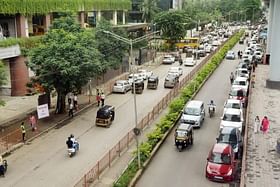The proposal expects to reduce the parking and traffic congestion in the city by allowing underground parking below recreational spaces.
However, there is some opposition from residents highlighting concerns regarding flooding and chopping of trees for the development.
During the 2023-2024 budget, the Brihanmumbai Municipal Corporation (BMC) proposed the development of parking infrastructure by setting up of mechanical robotic parking systems in the city.
The document further mentioned that the process regarding the work order for the proposed development is underway at three places — Raosaheb Patwardhan Park, Veermata Jijabai Bhosale Udyan and Zoo at Byculla East and Municipal Engineering Hub in Worli.
With this, the BMC has revived its plan to create underground parking lots involving development below open spaces in the city, which has been under discussion, for the past six to seven years.
This also includes a few green spaces and parks, following demands from the local MLAs.
One being the Raosaheb Patwardhan Garden on Linking Road in Bandra West, the civic body has proposed a similar underground facility in Pushpa Narsee Park at JVPD scheme in Juhu.
In February 2023, the additional municipal commissioner, P Velarasu visited the two parks to examine the sites and instructed to float the tenders for the construction of these parking lots.
Plans For Underground Parking
The purpose of this development is to reduce the parking and traffic congestion in the city, which has become a substantial issue due to a significant rise in the number of vehicles.
Over the last five years, vehicle numbers in Mumbai have increased by up to 56 per cent, and approximately 700 new vehicles are added to the city roads every day.
The lack of adequate space, combined with unregulated stopping and encroachments has resulted in occupying almost one lane of most of the city roads for parking purposes.
These have been factors for added congestion, traffic and cruising — causing various spatial difficulties on the city roads and surroundings.
Looking at the defined infrastructure developed for parking in the city, there are 91 on-street parking lots.
Of this 69 are operational and the remaining 22 cannot be accessed as they has been acquired for various infrastructure and development works.
With surface parking not being able to address the growing challenges and parking requirements of the city, the BMC made a provision in the Development Control and Promotion Regulations (DCPR) 2034, for allowing underground parking below recreational spaces and playgrounds.
The proposals take into account the significance of the natural qualities of these spaces and its importance for the city and its inhabitants.
P Velrasu, additional commissioner (projects), said, “We assure that the garden users will not have any disturbance in the existing garden or park. Only a barren plot will be utilised for making this underground parking lot.”
As in case of Patwardhan Park, it is spread over 18,868 square metres, out of which 2,137 square metres will be used up for the parking lot — which is estimated to accommodate 228 cars.
BMC said that the project will not disturb any trees, as per a report by Hindustan Times.
The floated tender includes ‘planning, design, construction’ of an underground multi-level electromechanical car parking system on the north side of Bal Gandharva Rangmandir at Patwardhan Park.
In addition to the proposals under parks, the other tenders floated includes — a five-storey parking lot on a traffic island opposite Apsara Pen shop at Flora Fountain, for 200 cars, and another to accommodate 640 cars, at the engineering hub building at Dr E Moses Road in Worli.
Opposition From Residents And Activists
However, these plans are facing continuous opposition from activists and residents, who believe that it will destroy the green cover where it is being planned.
The opposition from residents highlights concerns regarding flooding and chopping of trees for the development.
A resident said, “The park is for the people. Juhu is already a low-lying area that is prone to waterlogging. We cannot let go of the big catchment area that acts as a sponge. Concretising the ground would mean it would lose the ability to absorb rainwater. The BMC holds many places that it can use for underground parking,” as per a Mid-day report.
The residents in Juhu held a meeting to discuss the issue, while the residents in Bandra also decided to discuss the advantages and disadvantages of the idea.
Around 70 residents of Bandra decided to oppose the proposal and meet local political representatives and BMC officials to put forth their views, as per another Mid-day report.
The residents said that BMC has enough unutilised parking lots and paid parking lots encroached by hawkers in and around the area which the BMC can investigate first.
Earlier also in 2018, BMC’s plan for underground parking below Patwardhan Park was met with similar resistance from people in Bandra.
As a result, the revised plan suggests development not under the park but under the plot adjoining it.
Meanwhile, amid stiff opposition from citizen groups, Chief Minister Eknath Shinde expressed that the BMC has incorporated these proposals in its planning as underground parking lots have been suggested in the DCPR 2034.
“In the DCPR 2034, under Section 56, it is suggested to have underground parking. So underground parking across wards below gardens/parks, playgrounds and public open spaces have been incorporated by the BMC in its planning,” the CM gave his written reply to a question raised by BJP MLC Prasad Lad on the BMC’s pedestrian-first policy and the state of parking in Mumbai, as per a TOI report.


